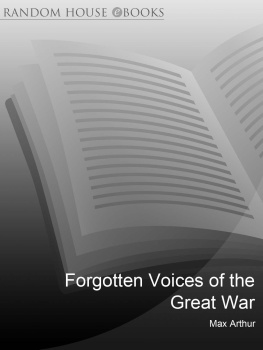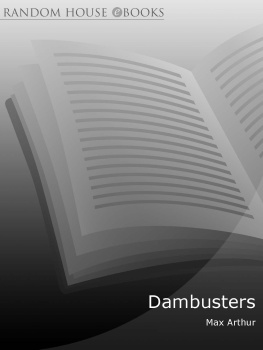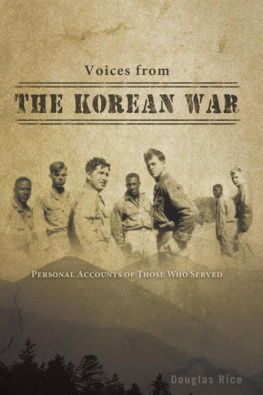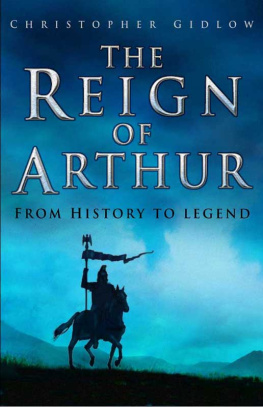Arthur - Forgotten Voices Of The Great War
Here you can read online Arthur - Forgotten Voices Of The Great War full text of the book (entire story) in english for free. Download pdf and epub, get meaning, cover and reviews about this ebook. City: London, year: 2012;2003, publisher: Ebury Publishing, genre: Non-fiction. Description of the work, (preface) as well as reviews are available. Best literature library LitArk.com created for fans of good reading and offers a wide selection of genres:
Romance novel
Science fiction
Adventure
Detective
Science
History
Home and family
Prose
Art
Politics
Computer
Non-fiction
Religion
Business
Children
Humor
Choose a favorite category and find really read worthwhile books. Enjoy immersion in the world of imagination, feel the emotions of the characters or learn something new for yourself, make an fascinating discovery.
- Book:Forgotten Voices Of The Great War
- Author:
- Publisher:Ebury Publishing
- Genre:
- Year:2012;2003
- City:London
- Rating:4 / 5
- Favourites:Add to favourites
- Your mark:
- 80
- 1
- 2
- 3
- 4
- 5
Forgotten Voices Of The Great War: summary, description and annotation
We offer to read an annotation, description, summary or preface (depends on what the author of the book "Forgotten Voices Of The Great War" wrote himself). If you haven't found the necessary information about the book — write in the comments, we will try to find it.
Arthur: author's other books
Who wrote Forgotten Voices Of The Great War? Find out the surname, the name of the author of the book and a list of all author's works by series.
Forgotten Voices Of The Great War — read online for free the complete book (whole text) full work
Below is the text of the book, divided by pages. System saving the place of the last page read, allows you to conveniently read the book "Forgotten Voices Of The Great War" online for free, without having to search again every time where you left off. Put a bookmark, and you can go to the page where you finished reading at any time.
Font size:
Interval:
Bookmark:
Contents

Well, a lot of people thought it would be over by Christmas.I was never one of those.
In the glorious sunshine of June 1914 there was no thought of war, no international crisis and no hint that the crowned heads of Europe were poised to tumble one after the other. The assassination of the heir to the Austro-Hungarian Empire by a Serb-sponsored terrorist on 28 June was neither predictable nor inevitable. Yet within weeks, millions of men were on the march. On 4 August with Austria and Germany already at war with Russia and France, and with German troops marching into Belgium on their way to Paris, Britain declared war on Germany.
Thus it was that the main body of the British Army was shipped to France. Unlike their allies and enemies, recruited by mass conscription, the British had a small professional army of volunteers: even with the recently created (1908) Territorial Force and all the reserves mobilised, the British had fewer than 750,000 men in uniform, of whom 247,432 were regulars with the colours. France, prepared since 1871 for another war with Germany, had 823,000 men in service in 1914; by the end of August they were reinforced by some 2,870,000 reservists reporting for duty. For all the excellence of their pre-war training and vastly higher standards, the six British infantry divisions could make little strategic difference to the 1914 campaign in western Europe. France had 62 divisions; Germany fielded 87; Russia had 114.
The British Expeditionary Force (BEF) disembarked in France in August while the French launched an all-out offensive to recapture the provinces of Alsace and Lorraine, annexed by Germany after the war of 1870. Unwittingly the French were playing into the hands of their opponents: the German strategy, honed over years by the General Staff, was to gamble everything on a knockout blow in the West. The French assaults collapsed in ruin while a colossal outflanking movement took place: the German 1st and 2nd Armies swept in a wide arc through Belgium and into France intent on swinging around to seize Paris and strike the main French armies from the flank and rear.
The first major action involving the British Expeditionary Force took place on 23 August amid the slagheaps and pitheads of the coalfields at Mons. The outnumbered British regulars gave the German conscripts a bloody nose before withdrawing. There was some hard marching ahead, although the epic rearguard action by II Corps at Le Cateau on 26 August gained valuable time. During the last week of August the French succeeded in withdrawing in good order to the river Marne. Their commander, General Joffre, jettisoned pre-war strategy and reorganised his forces for a counter-strike on the approaches to Paris. On 57 September French attacks from the direction of Paris dislocated the main German thrust, which had outrun its supply depots with grave consequences for its artillery and transport units (all horse-drawn). Joffre raced between his subordinate headquarters in a sports car, coordinating the actions of the French armies. By the end of the year he had sacked two out of five army commanders, nine corps commanders and half his seventy-two divisional commanders. By contrast, General von Moltke, the German Commander-in-Chief, lost control of his army commanders and, ultimately, of himself. He attempted to command by radio from his remote headquarters once the armies had outrun their telephone lines, but the temperamental machinery broke down and the French listening post atop the Eiffel Tower monitored the transmissions.
Eventually, Moltke sent one of his staff officers to drive between the German army commanders and order them to fall back to defensive positions if he deemed it necessary. Germanys grand strategy had failed. The confusingly fluid front-line of August and September congealed all the way to the North Sea, leaving the rival armies confronting each other along 460 miles of hastily dug trenches. The new German Commander-in-Chief, General von Falkenhayn, ordered a last attempt to break through to Dunkirk and Calais at the end of October but the attack was stopped by the British and French at the Belgian town of Ypres. This halted the German advance but left the British in an exposed salient. Indeed, all along the front the Germans were able to pull back to defensive positions and entrench themselves on the high ground.
Although two German corps were diverted from France to the Eastern Front for the struggle against Russia, it was clear that the main theatre of war would remain the Western Front. While Germany was obliged to stiffen its AustroHungarian allies with increasing numbers of divisions, the main body of the German army remained in France and Belgium facing the British and French.
Private Reginald Haine
1st Battalion, Honourable Artillery Company
My first reaction to the outbreak of war was more or less a blank, because I really did not think much about it. I was only just eighteen, and right at the start I didnt think that it would affect me to any extent. I was an articled clerk to a firm of chartered accountants and I was due for a fortnights holiday. I went on that holiday on August the 4th.
When I came back I went back to the office on the Monday morning and a friend of mine phoned me and said What are you doing about the war? Well, I had thought nothing about it at all. He said, Well, I have joined my brothers regiment which is the Honourable Artillery Company. If you like, come along, I can get you in.
At lunchtime I left the office, in Southampton Row, went along to Armoury House, in the City Road, and there was my friend waiting for me. There was a queue of about a thousand people trying to enlist at the time, all in the HAC it went right down City Road. But my friend came along the queue and pulled me out of it and said, Come along! So I went right up to the front, where I was met by a sergeant-major at a desk. My friend introduced me to the sergeant, who said, Are you willing to join? I said, Yes Sir. He said, Well, how old are you? I said, I am eighteen and one month. He said, Do you mean nineteen and one month? So I thought a moment and said, Yes Sir. He said, Right-ho, well sign here please. He said, You realise you can go overseas? So that was my introduction to the Army.
Private William Dove
16th Lancers
War had been declared, and the following Sunday I went with a friend of mine to Shepherds Bush Empire to see the film show. At the end they showed the Fleet sailing the high seas and played Britons Never Shall Be Slaves and Hearts of Oak. And you know one feels that little shiver run up the back and you know you have got to do something. I had just turned seventeen at that time and on the Monday I went up to Whitehall Old Scotland Yard and enlisted in the 16th Lancers.
Private Thomas McIndoe
12th Battalion, Middlesex Regiment
It was seeing the picture of Kitchener and his finger pointing at you any position that you took up the finger was always pointing to you it was a wonderful poster really.
I was always a tall and fairly fit lad. When I confronted the recruiting officer he said that I was too young, although I had said that I was eighteen years of age. He said, Well, I think you are too young son. Come back in another year or so. I returned home and never said anything to my parents. I picked up my bowler hat, which my mother had bought me and which was only to wear on Sundays, and I donned that thinking it would make me look older. I presented myself to the recruiting officer again, and this time there was no queries, I was accepted. Birth certificates were not asked for, although I had one, not with me but I had one. My mother was very hurt when I arrived home that night and told her that I had to report to Mill Hill next morning. I was sixteen in the June.
Next pageFont size:
Interval:
Bookmark:
Similar books «Forgotten Voices Of The Great War»
Look at similar books to Forgotten Voices Of The Great War. We have selected literature similar in name and meaning in the hope of providing readers with more options to find new, interesting, not yet read works.
Discussion, reviews of the book Forgotten Voices Of The Great War and just readers' own opinions. Leave your comments, write what you think about the work, its meaning or the main characters. Specify what exactly you liked and what you didn't like, and why you think so.















